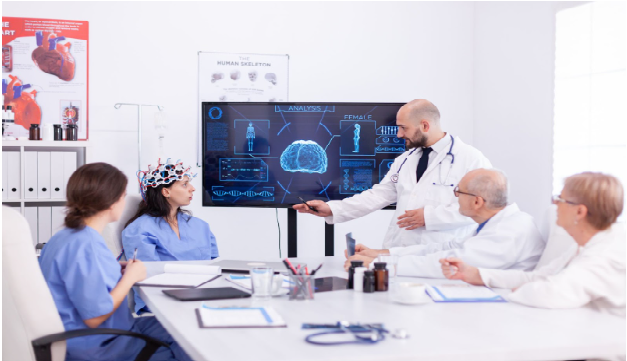
How AI is Revolutionizing Personalized Medicine
In the rapidly evolving field of healthcare, artificial intelligence (AI) stands out as one of the most transformative innovations. The integration of AI into personalized medicine marks a significant shift from traditional medical practices, where treatments were often generalized, to a more precise and individualized approach.
AI-driven personalized medicine tailors treatments to each patient's unique genetic makeup, lifestyle, and environmental factors, promising better outcomes and fewer side effects. This article explores how AI is revolutionizing personalized medicine and reshaping the future of healthcare.
Personalized medicine, also known as precision medicine, is a healthcare approach that customizes treatment based on an individual's genetic profile, lifestyle, and environment. Unlike traditional methods that apply a universal treatment protocol to all patients, personalized medicine aims to develop tailored strategies for disease prevention, diagnosis, and treatment.
This approach recognizes that each person is unique, and their response to treatments can vary significantly based on genetic differences. The goal is to optimize therapeutic outcomes and minimize the risk of adverse reactions.
AI’s role in personalized medicine is vast and ever-growing, particularly in its ability to handle and analyze enormous datasets with precision. By identifying patterns and making predictions that are beyond human capacity, AI transforms how we approach healthcare. In personalized medicine, AI is crucial for analyzing genetic data, predicting disease risks, and crafting individualized treatment plans.
If you’re interested in games and sports and wish to dive deeper into the topic, click here to explore more.
One of the most profound applications of AI in personalized medicine is in genomics. Genomics involves the study of a person's genes (the genome) and how they interact with each other and the environment. AI can process vast amounts of genomic data quickly, identifying patterns and mutations associated with specific diseases.
For instance, AI algorithms can detect genetic markers linked to cancer, cardiovascular diseases, and other chronic conditions, enabling earlier diagnosis and more effective treatment plans. This AI-driven approach to genomics is opening new avenues for precision medicine, where treatments can be tailored to the individual's genetic profile.
Another critical area where AI is making strides is predictive analytics. AI systems analyze historical and real-time data to predict potential health issues before they fully manifest. This predictive capability allows healthcare providers to intervene early, potentially preventing the onset of diseases or mitigating their impact.
For example, AI can predict the likelihood of developing conditions such as diabetes, heart disease, or even certain types of cancer, based on a combination of genetic, lifestyle, and environmental data. This proactive approach not only improves patient outcomes but also reduces healthcare costs by minimizing the need for more intensive treatments later.
AI's ability to analyze diverse data sources enables the creation of highly personalized treatment plans. These plans consider not only the patient's genetic information but also their medical history, current health status, and even lifestyle factors such as diet and exercise. This comprehensive approach ensures that treatments are not just effective but also suitable for the patient's specific needs.
For instance, in oncology, AI can help oncologists design personalized cancer treatment plans that target the unique characteristics of a patient's tumor, increasing the chances of successful outcomes and reducing the risk of side effects.
The drug development process has historically been time-consuming and costly, often taking years to bring a new drug to market. However, AI is revolutionizing this process by accelerating the identification of potential drug candidates and predicting their interactions with human biology.
AI algorithms can analyze vast datasets of biological information to identify molecules that are most likely to succeed in clinical trials, reducing the time and cost associated with drug development. Moreover, AI can help identify patient populations most likely to benefit from a new drug, further personalizing treatment and improving patient outcomes.
AI is also transforming patient monitoring by enabling continuous and real-time tracking of health metrics. Wearable devices equipped with AI can monitor vital signs, activity levels, and other health indicators, providing healthcare providers with a constant stream of data. This data can be analyzed to detect early signs of potential health issues, allowing for timely interventions.
For patients with chronic conditions, AI-powered monitoring systems can alert healthcare providers to any deviations from normal patterns, ensuring that any problems are addressed before they escalate. This continuous monitoring is particularly valuable in personalized medicine, where treatments and care plans can be adjusted in real time based on the patient's current condition.
While the benefits of AI in personalized medicine are clear, they come with significant ethical considerations. Privacy is a major concern, as AI systems require access to sensitive personal health data to function effectively. Ensuring that this data is protected and used responsibly is paramount.
Additionally, there is the potential for bias in AI algorithms, which could lead to disparities in healthcare delivery. It is essential to develop AI systems that are transparent, fair, and accountable, with robust regulations in place to protect patients' rights and ensure equitable access to personalized care.
As AI technology continues to evolve, its role in personalized medicine will only grow. The future of healthcare is one where treatments are not just advanced but deeply personal, tailored to the unique needs of each individual. By harnessing the power of AI, we are moving towards a world where healthcare is proactive, predictive, and personalized, offering patients the best possible outcomes.
The revolution in personalized medicine is just beginning, and the possibilities are limitless. To stay ahead of these groundbreaking developments and explore how AI is transforming healthcare, click here to access the latest insights and innovations in personalized medicine.